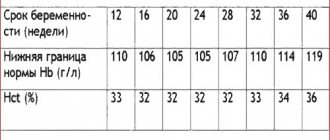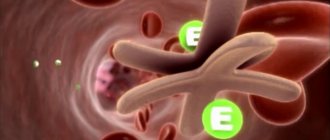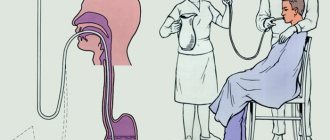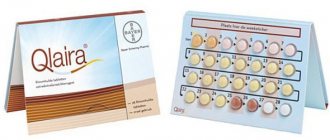Emergency contraception is a one-time protection against conception, permissible for use 1-2 times a year. The effect of postcoital drugs is aimed at preventing the process of ovulation, changing the structure of the uterine mucosa, reducing the likelihood of implantation even in the event of fertilization.
After taking contraceptives, the changes that occur in a woman’s body are completely reversible. Sometimes gynecologists prescribe emergency medications to correct hormonal imbalances. The choice of drugs requires an individual approach.
What is emergency contraception
Postcoital contraception is used in cases where conventional barrier contraceptives have failed or sexual intercourse occurred unplanned. Such pills help avoid negative consequences if taken within 72 hours after the act. Experts say that the sooner you take the pill, the greater the likelihood of stopping the process of conception.
Mechanism of action
The principle of action of emergency pills is based on interrupting conception at the first stage and the impossibility of developing a fertilized egg.
There are 2 types of such funds:
- Preparations based on levonorgestrel (Postinor, Escapel, Eskinor F).
- Contraceptive pills based on mifepristone (Miropriston, Mifegin, Zhenale).
The action of drugs based on levonorgestrel is that the active substance is aimed at blocking or delaying ovulation. Levonorgestrel also changes the composition of cervical mucus, making it more difficult for sperm to penetrate the uterus. But if fertilization does occur, levonorgestrel prevents the implantation of the egg into the uterus due to structural changes in the endometrium.
The action of the tablets of the second group is similar. Mifepristone-based birth control pills also inhibit the ovulation process. As a result, the endometrium of the uterus does not undergo the changes necessary for the successful implantation of a fertilized egg.
The choice of tablets can be made based on cost and effectiveness. But in pursuit of a low price, we must not forget that in order to achieve the best results, it is necessary to opt for high-quality drugs.
Efficiency
Such pills effectively prevent the onset of unplanned pregnancy, but often provoke hormonal imbalance. It should be understood that regular use of such drugs is unacceptable, because the greater the amount of hormones that constitute their basis, negatively affects not only gynecological health, but also the entire body as a whole.
When is the best time to take medications:
- if taken within the first 24 hours, it will provide a 95% chance that conception will not occur;
- if you take the pill within 48 hours, the chance of pregnancy increases by 10%;
- If you take it within 72 hours, the probability of results will be only 50-60%.
Today, a woman can purchase emergency protective equipment at any pharmacy.
Indications
It is better to take such emergency contraception immediately after unprotected vaginal sex, since in this case the chance of interrupting the pregnancy is quite high.
Indications for the use of emergency protective equipment are the following situations:
- unprotected sexual intercourse;
- the usual method of contraception turned out to be unreliable (for example, the condom broke);
- missed a dose of oral contraceptive;
- unplanned sexual intercourse.
In some cases, the indication for taking emergency medications is a course of treatment with drugs that reduce the effectiveness of permanent oral contraceptives.
Contraindications
Modern drugs are certainly safer than their predecessors. But, nevertheless, they also cause some damage to women’s health. Doctors warn that you can take them no more than once every 3-6 months. Abuse of such pills can cause serious gynecological diseases, ectopic pregnancy and subsequent problems with conception. They have a rather large list of contraindications, which every woman needs to familiarize herself with.
Main contraindications:
- liver and kidney pathologies;
- age up to 16 years;
- venous insufficiency;
- instability of the menstrual cycle;
- bleeding;
- bleeding disorders;
- During pregnancy and breastfeeding;
- individual intolerance to components;
- severe chronic diseases.
Such drugs are not prescribed to women over 35 years of age. These contraceptives contain a huge amount of hormones. This can lead to serious hormonal imbalance. Therefore, this type of protection should be used with extreme caution. Before using it, it is recommended to consult a specialist and clarify the possible consequences.
Do birth control pills really protect against pregnancy?
Oral contraceptive pills prevent the risk of pregnancy in 98 cases out of a hundred. The effectiveness of oral contraception is affected by interactions with other medications (antibiotics, activated charcoal, laxatives).
Gastrointestinal disorders accompanied by vomiting or diarrhea reduce the reliability of contraceptives.
It is also important to take into account the period for taking the pills, set by the gynecologist after studying the woman’s medical history and the results of laboratory tests. During a medical examination, a number of parameters are subject to assessment:
- weight, blood pressure;
- type of skin, hair;
- condition of the mammary glands;
- blood biochemistry;
- condition of the visual organs (examination by an ophthalmologist);
- the presence of somatic pathologies;
- predisposition to major diseases at risk;
- contraindications.
Oral contraception is prescribed based on the ratio of hormones:
- COC is a combined composition. The active substance is progestogen and ethinyl estradiol. Depending on the ratio of hormones, monophasic, biphasic, and triphasic COCs are distinguished.
- The mini-pill is a non-combined oral contraceptive based on the progestogen hormone (does not contain estrogen).
Benefits of taking hormonal contraceptives:
- Improving the condition of hair and skin, treating skin diseases.
- Prevention of severe complications (ectopic pregnancy).
- Reducing the risk of developing osteoporosis.
- Blocking the development of tumor diseases. Therapeutic effect (gynecologists note many cases of cure of uterine fibroids).
- Prevention of inflammatory processes.
- Elimination of premenstrual syndrome, painful physical sensations during menstruation.
Kinds
All disposable contraceptives are divided into two types: hormonal and non-hormonal.
Hormonal
Drugs based on levonorgestrel are usually called hormonal. They contain a large number of hormones that can negatively affect a girl’s health.
Gynecologists note that such drugs can cause not just hormonal imbalance, but also complex gynecological pathologies, including obesity and infertility. Therefore, they should be used especially carefully.
Hormonal drugs include:
- Postinor;
- Escapelle;
- Eskinor F.
Such drugs cannot be used without a doctor's prescription. If you don’t have time to visit a gynecologist, then you should limit yourself to one-time use. And then be sure to consult a specialist.
Non-hormonal
Medicines that do not contain hormones include medications based on mifepristone.
Let's list them:
- Zhenale;
- Gynepriston;
- Ageta;
- Miropriston.
Tablets based on this substance do not disrupt hormonal levels. That is why they are very popular among girls.
Doctors have proven that these drugs are more effective than hormonal ones. After using them, the likelihood of any deviations occurring is minimal.
Safety of hormonal drugs
Possible unwanted symptoms:
- nausea and vomiting;
- abdominal pain;
- feeling of weakness;
- headache and dizziness;
- soreness of the mammary glands;
- bloody discharge from the vagina (not in the nature of menstruation);
- change in the start date of the next menstruation (usually a week earlier or later than expected).
If your period is delayed by more than a week after emergency contraception, you must rule out pregnancy by purchasing a test at the pharmacy or consulting your doctor. Bleeding after administration is not dangerous and will stop on its own. Its likelihood increases with repeated use of tablets during one cycle. However, if it occurs in combination with delayed menstruation and abdominal pain, it is recommended to consult a doctor. This may be a sign of an ectopic (ectopic) pregnancy. However, it has been proven that taking postcoital contraception does not increase the likelihood of such an event. Women who have had an ectopic pregnancy before can also take these drugs.
To reduce the risk of vomiting, the use of combination drugs should be minimized, since levonorgestrel very rarely causes this side effect. If vomiting occurs within two hours after taking the medicine, you need to repeat the dose. In case of intense vomiting, antiemetic drugs (Metoclopramide, Cerucal) can be used.
If you experience a headache or discomfort in the mammary glands, you should use a regular painkiller (paracetamol, etc.).
Emergency contraceptive tablets have no contraindications as they are considered safe. They are not prescribed during an existing pregnancy, because there is no point in doing so. However, if pregnancy has not yet been diagnosed, taking levonorgestrel is harmless to the developing fetus. Levonorgestrel drugs are not able to terminate an existing pregnancy, so their effect is not similar to medical abortion. A normal pregnancy after emergency contraception can occur in the next cycle.
Serious adverse effects on women's health have not yet been reported following the use of levonorgestrel drugs for postcoital contraception. Therefore, they are allowed to be used even without a doctor’s examination, including in many countries around the world they are sold without a prescription.
Advantages and disadvantages
Of course, taking a disposable contraceptive has positive and negative aspects.
The advantages include the speed and effectiveness of such tablets.
The disadvantages will be a high risk of hormonal instability and an unguaranteed result.
Any doctor will most likely advise you to avoid this method of preventing pregnancy. Condoms and the IUD (a device placed in the vagina and uterus) will be more reliable. However, in case of unforeseen circumstances, these funds are an excellent solution.
Use of hormones in special cases
- Emergency contraception during lactation is considered safe for both mother and baby. However, some doctors advise first feeding the baby, then taking the drug, periodically expressing milk over the next 6 hours without using it to feed the baby, and only then resuming feeding. It is better if this time is up to 36 hours. If less than 6 months have passed since the birth of the child, and the woman is breastfeeding and does not have menstruation, then it is possible that she does not need to use protection, since she has not yet ovulated.
- If more than 120 hours have passed since sexual intercourse, then the use of emergency contraception medications is possible, but its effectiveness has not been studied. In this case, emergency intrauterine contraception becomes preferable.
- If several unprotected contacts have occurred over the past 120 hours, then one dose of the pill will eliminate the possibility of pregnancy. However, it should be taken after the first such sexual intercourse.
- Emergency postcoital contraception can be used as often as needed, even during a single cycle. The harm from frequent use of such drugs has not been proven in large studies, and in any case, the occurrence of an unwanted pregnancy is much more dangerous. However, it is much more effective and convenient to take oral contraceptives regularly or use other planned methods.
Regimen for disposable contraception
All disposable contraceptives are used according to their own scheme. In order for the product to really help, you need to know the rules for taking it.
The drugs "Escapelle" and "Eskinor F" are taken once. Their package contains only 1 tablet, which must be taken within 72 hours after sexual intercourse. The maximum effectiveness of drugs with levonorgestrel is observed when taking the drug within 24 hours (up to 95%). Every hour the percentage of efficiency decreases.
"Postinor" is taken according to a certain, more complex scheme.
Rules for taking Postinor:
- The first tablet must be taken immediately after sexual intercourse (no later than 48 hours).
- The second one 12 hours after taking the first one.
- If nausea or vomiting occurs after taking the first dose, you need to take the pill again.
Mifepristone-based medications are taken once every 72 hours. Before taking them, it is recommended to refuse food and water for 2-3 hours.
Side effects
After taking the pill, you will still have to do a test, donate blood for hCG, and go for an ultrasound. It is worth remembering that everyone has different body characteristics. Just because the medicine helped your friend, this does not mean that it will have the same effect on you. Even if your period arrives on the exact day, this does not guarantee that the emergency pill has worked.
Typically, after taking Postinor, women experience various adverse reactions:
- failure of menstruation: absence, early or, conversely, late onset;
- enlargement of the mammary glands and pain in them;
- rapid breathing;
- nausea, headaches, weakness;
- bloody brown discharge;
- apathy, emotional decline.
If the drug does not help, you need to urgently go to the doctor - the pills increase the risk of developing pregnancy outside the uterus. Therefore, be sure to make sure that the fetus is in the uterus and not in one of the tubes.
If pregnancy occurs, do not worry, the hormonal drug does not harm the development of the child. If there are no contraindications, then there is no need to artificially interrupt it.
Effect on the body
If used incorrectly or if the body is intolerant to any components, side effects and complications may occur.
Negative consequences
The instructions for the medications contain a list of possible negative symptoms. You should not think that they must necessarily appear. This opinion is wrong. Each body reacts differently to contraceptive medications.
What may appear:
- swelling and tenderness of the breast;
- headache;
- aching or pulling pain in the lower abdomen;
- irritability;
- allergic reaction to the skin - itching and rashes;
- nausea and vomiting.
There is a myth that the deviations that have arisen mean that the process of conception has already begun and an artificial “miscarriage” occurs. These are just rumors: the symptoms listed above can only indicate a negative reaction to the drug taken.
In addition to the usual ailments, these drugs can also cause a number of urgent (critical) conditions if taken incorrectly.
Among them:
- Ectopic pregnancy.
- Increased risk of infertility.
- Blood clot formation.
- Menstrual irregularities.
- Bleeding.
Before taking pills, it is better to visit a specialist and get his permission to do so. He will help you choose the right drug that will cause minimal damage to the body.
Side effects and contraindications
When studying the topic of postcoital method of protection against pregnancy, you must clearly understand the main thing: any, even the most effective methods of medical emergency contraception cannot be absolutely harmless. The following side effects may occur after using medications:
- disruption of the menstrual cycle;
- heavy menstrual flow;
- pain in the lower abdomen;
- drowsy, lethargic state;
Birth control pills after unprotected sex are contraindicated if the following diseases/conditions occur:
- uterine bleeding;
- age over 35 years;
- attacks of headache;
- many years of smoking experience;
- severe forms of liver disease.
Drug rating
All drugs vary in price and quality. Gynecologists distinguish among them the most effective and more gentle ones.
Postinor
This product has been on the pharmaceutical market for several decades. It is one of the most effective drugs that prevent ovulation and fertilization.
It is based on an analogue of the hormone levonorgestrel. Each tablet contains 0.75 mg of active substance + auxiliary elements.
It is recommended to take Postinor after meals with an interval of at least 12 hours (the first tablet should be taken within 48 hours, and the second - 12 hours after the first).
When used correctly, the drug is effective up to 95%.
Contraindications for use are thrombosis, hypertension, bleeding disorders, liver and kidney diseases, cancer and cardiovascular pathologies, pregnancy and lactation.
Side effects may include uterine bleeding, nausea, abdominal pain, and allergic reactions.
The cost varies from 350 to 500 rubles. The package contains a double dose of the drug.
Escapelle
Escapelle in its composition and mechanism of action is very similar to Postinor. It is based on the same active ingredient - levonorgestrel. However, the dose of the substance has been doubled. This is due to the fact that Escapelle’s dosage regimen is shortened. The package contains one tablet, which must be taken within 72 hours after the act. No re-application required.
Contraindications and side effects for Escapel and Postinor are practically the same. It is worth noting that it is strictly prohibited to use it if a woman is sick or has already suffered from jaundice. Then you should choose another medicine.
The advantage of Escapel is that it does not have a negative effect on the fetus. This means that if the drug was taken when the pregnancy process was already ongoing, then nothing bad will happen. These contraceptives do not have a negative effect on the development and formation of the fetus.
The price of Escapelle varies from 300 to 450 rubles.
Gynepristone
Gynepristone is a postcoital contraceptive that contains a high concentration of mifepristone. This drug is also effective in preventing pregnancy if taken within 48 hours of sexual intercourse. To achieve maximum effect, you must stop eating 2 hours before your appointment.
Contraindications to the use of contraceptives are chronic renal and liver failure, blood clotting disorders, cardiovascular disorders, high blood pressure, high sensitivity.
Possible side effects are no different from other drugs: reactions from the digestive, nervous system, allergies, menstrual irregularities and bleeding.
The price of the drug varies from 180 to 300 rubles.
Mifepristone
This contraceptive differs from other contraceptives in that it can be used to perform an abortion. That is, like other drugs, Mifepristone can be taken within 3 days after unprotected intercourse or used to terminate an ongoing pregnancy (if the period is not more than 6 weeks).
1 tablet contains 200 mg of active and excipients.
The package may contain from 3 to 6 tablets.
This remedy has an extensive list of contraindications and side effects, so it should be taken after consultation with a gynecologist.
Termination of pregnancy should be carried out exclusively in a medical institution under the supervision of doctors. To provoke a miscarriage, a woman should take three tablets at once 1.5 hours after eating. The drug is not dispensed without a specialist's prescription.
Ovidon
This drug is less commonly used for postcoital contraception.
The use of Ovidone as a contraceptive is better known as the Yuzpe method. You should take the tablets twice in an increased dose - from 2 to 4 pieces.
These oral contraceptives are intended for continuous use, but in emergency cases they can be used as a quick-acting remedy to prevent unwanted pregnancy. It is important to correctly calculate the required dose in such a way as to achieve the desired result without harming your health.
Action of COC
This section will discuss the mechanism of action of birth control pills after unprotected intercourse (COC). These drugs can suppress the ovulation process, thicken the cervical mucus so that the movement of sperm becomes much more difficult, and change the endometrium, which is an obstacle to the implantation of a fertilized egg in the uterine cavity.
This action is provided by a component included in the drug - progestogen. You can also find ethinyl estradiol in the composition, which ensures a normal menstrual cycle, that is, there should be no intermediate bleeding. The menstrual cycle should not be disrupted. In addition, it is worth knowing that when taking COCs, the ovaries do not produce estradiol, which is responsible for follicle growth. The substance ethinyl estradiol replaces it.
Reviews
This section contains reviews of girls who have resorted to post-coital contraception methods.
“After the first use of Postinor, I did not experience any side effects. The second time I used it, I felt a little weak and nauseous. There was no vomiting.
After a visit to the gynecologist, it was confirmed that I am not pregnant, so I am happy with these pills. An effective and fast way.
In addition, they can be bought at any pharmacy without a prescription.”
Marina, 32 years old
“My friends discouraged me from buying Escapelle. They scared me about bleeding and other side effects. I decided to try it because it costs less than the others.
After application, there was blood, but there was not much of it. I immediately ran to the doctor, he said that this was normal and did not find any pathologies.
So I recommend it, the drug helps.”
Olga, 20 years old
“After unprotected sexual intercourse, my husband bought Postinor. After it I felt very bad, I even had to call an ambulance. The stomach was washed out and everything returned to normal.
The second time I didn’t even look in his direction; the pharmacy recommended Mifepristone. I bought it because the price was reasonable. But even after it, side effects began: bleeding, dizziness.
Now I’m categorically against these pills, I’m afraid of developing severe pathologies.”
Elizaveta, 24 years old
“I had experience taking three drugs: Postinor, Ovidon and Ginepristone, since I can’t get pregnant. There are no complaints about any of them. I felt good.
After taking them, I didn’t go to the doctor because I didn’t feel any changes.
I bought them at a regular pharmacy for 200-300 rubles.”
Maria, 30 years old
“I really didn’t want to get pregnant, so I took Ovidon birth control pills immediately after the act. Mild nausea appeared, then vomiting.
I got scared and didn’t take the pill again. Two weeks later I found out I was pregnant.
The local doctor said that we should not have been afraid and take the pill a second time. I had to resort to abortion, and this is even worse.
So follow the instructions and take as many tablets as needed."
Elena, 28 years old
Traditional methods of contraception after unprotected intercourse
Traditional methods of preventing unplanned pregnancy are not the only ones. There are also traditional methods of contraception for women. It’s worth noting right away that none of them can provide a guaranteed effect. If you do not want to risk your future, use medications or an IUD. Grandmother's recipes are used in cases of absolute necessity, when it is not possible to visit a doctor or purchase a contraceptive drug.
Write down more or less effective folk remedies for yourself so as not to be unarmed in an unforeseen situation:
- Douching with a weak solution of lemon juice and water using an irrigator. Mix 200 ml of boiled water with the juice of one large lemon and thoroughly rinse the vagina with an irrigator. At the end of the emergency contraception procedure, wash the mucous membranes with clean water so that the acid contained in lemon juice does not disturb the vaginal microflora.
- Emergency douching with a solution of potassium permanganate . This procedure provides a contraceptive effect in 60% of cases, however, if the vagina is not properly treated, it can harm the internal genital organs, so be extremely careful. Make a solution in a ratio of 1:18 and perform the douching procedure. Potassium permanganate is a strong oxidizing agent that can deprive active sperm of their main function. After washing, perform genital hygiene using gentle soap.
- Slice of lemon . A dangerous, but at the same time quite effective method of contraception. After completing sexual intercourse, place a peeled medium-sized lemon slice into your vagina. The acid will do its job in a matter of seconds. Remove the pulp and wash the mucous membranes with warm water and soap to prevent disruption of the microflora.
- Laundry soap . Such contraceptives are extremely dangerous for women, but in some cases, when it is not possible to avoid pregnancy in other ways, you have to take risks. Within 10 minutes after unprotected intercourse, insert a matchbox-sized piece of soap into your vagina. After 15-20 seconds, remove it and immediately rinse the mucous membranes with clean water. To avoid depressing consequences, try to quickly get a moisturizer for the intimate area.
- Aspirin . Another method of emergency abortion using acid. Its effectiveness is about 50-60%. Like lemon juice, acetylsalicylic acid reduces the activity of sperm, as a result of which they do not reach their main goal - eggs. Do not try to use such contraceptive methods regularly as there may be consequences. Violation of the acid balance of the vagina can lead to serious diseases.
The listed “grandmother’s” means of emergency contraception can provide the desired result if used within 5-7 minutes after unprotected coitus. Combining the described methods is not recommended, as this can cause even more serious complications. If you are forced to resort to one of them, visit your gynecologist as soon as possible and describe in detail everything you have done for contraception.
Levonorgestrel-based drugs
COCs were created to eliminate unplanned pregnancy; each COC product contains the hormones estrogen and progestogen.
Ethinyl estradiol is used as a progestin component, and artificial progestogens are used as a progestogen component. Thanks to the combination of two hormones, they adapt to the real hormonal regime of the woman’s body. Considered very reliable. The mechanism of action occurs at the level of cellular receptors. Estrogens and progestin medications create a block in the organs of a woman’s reproductive structure. Next, ovulation is suppressed. The maturation and development of eggs is suppressed due to a decrease in the concentration and natural course of secretion of pituitary hormones. The effectiveness of COCs is close to 100%.
This type of drug can be purchased in a regular network of pharmacies, with a prescription from a gynecologist. When choosing pills on your own, it is necessary to take into account factors such as the day of the cycle, how much time has passed since sexual intercourse without protection, and what the patient’s body weight is. Be sure to read the instructions.
First, let's talk about how levonorgestrel and drugs containing it work. So, pregnancy-terminating pills related to emergency contraception after the first dose:
- immediately affect the chemical composition of the mucus of the endocervix (cervical canal of the cervix), also increasing its viscosity, thus slowing down the process of sperm penetration into the fallopian tube;
- act on the ovaries, preventing the release of a mature egg from the main follicle (subject to taking pills before ovulation), suppressing gonadotropic hormones, which ultimately blocks or delays the ovulation process;
- prevent the implantation of an egg fertilized by a sperm into the uterine walls for the further development of the embryo and the formation of a “baby” place. In order for fertilization to fail, levonorgestrel not only changes the structure of the endometrium, thereby preventing it from entering the secretory phase, without which ovulation does not occur, but also affects the uterine (fallopian) tubes. As a result, the number of their contractions is significantly reduced, which leads to to the impossibility of a fertilized egg entering the uterine cavity.
It is important to emphasize that you should take the above-listed medications, which include levonorgestrel, only after consulting a doctor. In addition, you should definitely read the instructions included with the tablets. The thing is that these contraceptives contain enormous doses of hormones.
After taking them, a hormonal imbalance occurs in the female body, the consequences of which can be unpredictable. Therefore, experts classify such contraceptive methods as “disposable” means, which are highly recommended not to be used more than 4 times a year. In addition, it is strictly prohibited to use such emergency contraceptive drugs more than once per menstrual cycle.
Emergency contraceptive pills (they are also called “morning-after pills” due to the specific nature of their administration) are an effective, but rather controversial method of protection against unplanned pregnancy. Doctors say that after just a single dose of such drugs, serious changes occur in the body, so it takes time to fully restore the functions of a woman’s reproductive system.
What can be said about the second group of emergency contraceptive drugs containing the antihormone mifepristone - they act almost the same as levonorgestrel-containing birth control pills, i.e. Also:
- inhibit the ovulation process;
- change the structure of the endometrium, which makes it impossible for the fertilized egg to attach to the uterine walls;
- strengthen uterine contractions, due to such hyperreactivity, the fertilized egg is “expelled” from the uterine cavity.
It is worth noting that to protect against unwanted pregnancy after unprotected sexual intercourse, you can also use non-hormonal drugs, for example, vaginal suppositories containing nonoxynol (Steridil, Nonoxynol) or benzalkonium chloride (Pharmatex, Erotex). The above drugs refer not only to methods of express contraception, since they have a spermicidal effect, their scope of application is much wider, due to their anti-inflammatory, antibacterial, antiviral and antifungal abilities.
The above names of pills for pregnancy after an act unprotected by any means of contraception are not all. Currently, any pharmacy has a good selection of such drugs. You can find out what emergency contraceptive pills are called directly from the pharmacist at the pharmacy, but it is better to ask your doctor about these questions. After all, any medicine (and contraceptives are no exception to this rule) has its own contraindications and side effects.
This is especially true for women with breastfeeding (breastfeeding) or suffering from certain diseases in which large doses of hormones or antihormones can be fatal. Although there is no clear answer to the question of whether birth control pills related to postcoital contraception are harmful, since what will be good and effective for some may result in serious health problems for others, not a single woman should use this method of solving the problem of unwanted pregnancy without prior medical consultation.
Only a specialist will be able, firstly, to choose the right drug, taking into account all the individual characteristics of the patient (an ordinary person can simply get lost in the names of pills that say nothing about the composition, contraindications or side effects after an unprotected act). And, secondly, the doctor will tell you how to take emergency contraceptives correctly so as not to harm your body and achieve the desired result.
There are several basic rules for taking postcoital contraceptive medications:
- It is necessary to strictly adhere to the period of use of such drugs. The vast majority of pills should be taken no later than 72 hours after unprotected intercourse. Many people have a question, how many days is 72 hours? It is well known that there are 24 hours in one day or one day, therefore, 72 hours are three days or three days. It is believed that the first emergency contraceptive pill should be taken as early as possible, while the second should be taken optimally 12 hours after the first or a maximum of 16 hours. It is important to emphasize that the effectiveness of the tablets depends directly on the period of their use. It is believed that drugs containing levonorgestrel are most effective within 24 hours after sexual intercourse (95% effective). When taken after 48 hours, the effectiveness decreases to 85%, and after 72 hours - to 58%. Tablets containing mifepristone are also taken no later than 72 hours after contact.
- It is important to adhere to the dosage indicated in the instructions for the drugs or prescribed by the doctor. As mentioned above, emergency contraceptive pills are taken twice after a certain period of time, for example, Postinor. However, this rule is not relevant for all drugs. Eskinor F or Escapel (contain levonorgestrel) and Zhenale, Ginepristone, Mifolian (contain mifepristone) take one tablet within 72 hours of sexual intercourse.
- It is strictly forbidden to independently adjust the dosage of birth control pills. This can lead to the development of side effects, as well as provoke serious negative consequences (bleeding, infertility). It is recommended not to eat food a couple of hours before taking emergency contraceptive pills and after, so that the biologically active compounds are better absorbed in the body. If vomiting occurs after taking the medications, you will have to take the pill again.
Contraindications and compatibility with other drugs
There are no obvious contraindications for the use of contraceptives after sexual intercourse. They are not prescribed during pregnancy because the fertilized egg does not depend on any form of contraception. There is nothing to worry about if a pregnant woman takes a contraceptive once: it will not harm the fetus. The only thing that can be dangerous about a contraceptive is a side effect.
Contraceptives are equally effective, regardless of when they were taken, before or after the act. However, to avoid problems, it is best to take them before sexual intercourse or after, for a short interval. The number of tablets taken does not affect the effectiveness; medications should be taken only according to the instructions.
Contraceptives are not intended for systemic use; they are “first aid” and not a permanent assistant. As a protection, it is better to use the usual methods of contraception (condoms).
Rescue medications may interact with other medications, except for some that may reduce the effectiveness of birth control.
Medicines to treat stomach ulcers, such as omeprazole, may reduce the effectiveness of the copper IUD. When taking Levonorgestrel in combination with drugs against stomach ulcers, the contraceptive should be used in double dose.
Pregnancy is the most wonderful period in a girl’s life. But the lack of readiness to become a mother forces girls to take drugs to end pregnancy.
In this article we will look at the best birth control pills after intercourse within 72 hours based on reviews.
Cost of tablets
| Name of tablets | Price, rubles |
| Microgynon | 310 |
| Lindynette | 340 |
| Jeanine | 790 |
| Chloe | 760 |
| Femoden | 820 |
| Tri-Merci | 1000 |
| Regulon | 480 |
| Mercilon | 1560 |
| Marvelon | 1530 |
| Logest | 810 |
| Gynepristone | 570 |
| Belara | 1980 |
| Femoston | 840 |
| Postinor | 290 |
| Orgametril | 1110 |
| Miropristone | 1560 |
| Eskinor-F | 220 |
Is it possible to get pregnant while taking birth control pills if they are chosen incorrectly?
You cannot choose birth control pills on your own, relying on the advice of friends or being guided by advertising. An incorrectly selected drug may not work, which means an unwanted pregnancy is possible.
This is interesting: What features should the best Botox for hair have?
Accidental conception despite taking birth control pills is not the only risk for women. Side effects are possible, in some cases disability and even death.
Each female body has its own unique characteristics, so when selecting medications, doctors pay attention to all the nuances. Only the right selection will ensure complete safety from unwanted pregnancy.
There is a phenotype table for women , according to which a specialist will determine whether oral medications can be taken and which ones.
| Selection of contraceptive pills that protect against pregnancy in case of differences in phenotype | |||
| Characteristic differences | Balanced look | Progesterone | Estrogen |
| Features of pregnancy | No | Weight gain, gag reflex, toxicosis | No |
| Breast development | Average development | Underdeveloped | Good development |
| Pubic hair | Female type | Male type | Female type |
| Beli | Moderate | Scanty | Abundantly |
| Psychological state before menstruation | Calm | Stressful | Nervous |
| Cycle duration | 28 days | Under 27 | Up to 30 days |
| Duration of menstruation | 4-5 days | 5 days | More than five days |
| Menstrual symptoms | No symptoms | Nagging pain in the abdomen, legs, lower back | engorged breasts |
| Abundance of menstruation | Moderately | Scanty | Abundantly |
| Scalp | Normal | Fat | Dry |
| Skin | Fine | Fat | Dry |
| Voice | Feminine | Rude | Deeply feminine |
| Height | Average | High | Short |
| Appearance | Women | Husband. | Women |
Who is not suitable for emergency contraceptive pills?
| It is better not to risk your own health and stop taking levonorgestrel-containing drugs if: | It is not recommended to take medications that contain mifepristone in the following situations: |
|
|
When is postcoital contraception acceptable?
It is possible to use emergency contraceptives if pregnancy is extremely undesirable:
- Less than 2 years have passed since the cesarean section.
- The sexual intercourse was of a violent nature.
- Past attempts to become pregnant have ended in miscarriage or ectopic pregnancy.
Before taking a serious medication, you should consider its contraindications:
- Age up to 18 years.
- Existing pregnancy.
- Menstrual irregularities.
- Malignant tumors.
If bleeding occurs after taking an emergency contraceptive, consult a gynecologist immediately.
If, 2 weeks after using the contraceptive drug, menstruation does not occur on time, you should also consult your doctor.
How to choose birth control pills after intercourse (source: “Pharmacist’s Handbook” 2014)
Which pills are better?
According to consumers, the best pills against unwanted pregnancy are Escapelle and Zhenale.
If a woman is not planning a pregnancy, then birth control pills after intercourse for 72 hours will help avoid unwanted conception. This method of protection in medicine is called the method of postcoital, emergency contraception. It is applicable in cases where unprotected sexual intercourse occurs and the woman does not use other methods of birth control (IUD, oral contraceptives).
What are the dangers of fire contraceptive pills?
Before you decide to use the birth control pills described above, you should learn about their consequences, which are sometimes irreversible:
- Ectopic pregnancy - The risk of such a terrible disease as ectopic pregnancy increases several times, since the process of transporting the egg is disrupted (see symptoms of ectopic pregnancy).
- Bleeding - Disruptions of the menstrual cycle are quite common, which can lead to massive bleeding, and the only way to stop it is to curettage the uterine cavity (this moment is fraught with a lot of complications).
- Threat of infertility in the future - For girls who are in puberty, taking emergency pills will not only disrupt the unsteady menstrual cycle, but in some cases will cause infertility in the future.
- Thrombosis - Massive doses of hormones present in these drugs can provoke thrombus formation, which can lead to stroke (see the first signs of stroke in women), pulmonary embolism and even death (especially in women with hemostasis disorders, after 35 years and in smokers).
- Crohn's disease - oral contraceptives and the morning after pill increase the risk of Crohn's disease by 3 times.
In addition, you should remember about the side effects that do not add charm to the situation:
- mastalgia (pain in the mammary glands), their swelling;
- severe nausea and even vomiting;
- significant headaches, migraines;
- nagging or aching pain in the lower abdomen;
- emotional instability;
- allergies in the form of itching and rash.
Every woman who cares about her health should watch this video before deciding to take any oral contraceptives (even low-dose ones). This is especially true for young girls who want to have children in the future. Even a healthy woman without obvious contraindications has a risk of developing pulmonary thromboembolism while taking OCs (see video to the end).
Types of contraception
Experts distinguish several categories of emergency contraceptives.
- Progestogens - These drugs contain gestagen hormones as an active component, which suppress the secretion of gonadotropin and prevent the onset of the ovulatory period. Also, such substances prevent cellular implantation into the uterus, but if the drug is taken after the implantation process has begun, then they are powerless. The use of progestin preparations in the first 3 days after unprotected sex reduces the risk of unplanned conception by 60%.
- Estrogen emergency contraceptives have a fairly long history of use. They are highly effective, but are accompanied by side reactions such as nausea and vomiting syndrome, blood clots, etc. The drugs are very teratogenic for the fetus, therefore, if conception still occurs after taking them, it is necessary to get rid of the child.
- Combined emergency contraception. They usually contain several active ingredients, for example, progestin and estrogen. These remedies are considered the most common among patients today. Combined contraception is taken according to the Yuzpe regimen, due to which it achieves 75 percent effectiveness. But side reactions to the drug are also possible, which include manifestations such as nausea and vomiting, menstrual irregularities, migraine pain, etc.
- Antiprogestin drugs - a category of these drugs consists of contraceptives with mifepristone as an active ingredient. This substance is often used for medical abortion. This component provokes ovulatory delay and causes endometrial atrophy, so the egg is not capable of implantation. The drugs are not without side effects, but they are easier to tolerate. These drugs are even approved for patients who have contraindications to other types of emergency contraception.
- Antigonadotropin contraception - the active components of the drugs block the production of gonadotropic hormones necessary for ovulation, so the cell does not develop and does not come out, and the uterine endometrial layer does not mature for the favorable reception of the embryo. When taken, traditional side effects such as nausea and vomiting, menstrual irregularities, etc. may occur.
ellaOne tablets (ellaOn)
Recently, the drug ellaOne appeared on the market, which can be taken within 120 hours after unprotected intercourse (that's 5 days).
ellaOne tablets contain Ulipristal Acetate.
The principle of operation of all oral contraceptives is to delay or prevent ovulation, the release of a mature egg, which, when it meets a sperm, will lead to pregnancy.
Who can accept
Almost all women can take ellaOne tablets. Among the contraindications:
- asthma
- liver disease
- pregnancy
You should also refrain from breastfeeding for one week.
Side effects
They are the same as with other emergency contraceptive pills.
Within a few days after taking the pill you may feel:
- pain in the lower back or lower abdomen
- more painful periods
- frequent mood changes
Do you need a doctor?
Be sure to consult a doctor if:
- there was a delay in menstruation by more than 7 days
- periods are not as heavy as usual
- they are accompanied by pain, which was not there before
- you want to make sure you haven't contracted any sexually transmitted diseases
Could ellaOne not work?
In rare cases, as with other radical contraceptive pills, ellaOne may not work and pregnancy will occur.
In this case, you will need to consult a doctor.
The contraceptive effect of ellaOne may be reduced if you vomit within 3 hours of taking the pill. Contact your doctor immediately (he may advise you to take another pill or use another means of emergency contraception).
If you vomit after 3.5 hours or more, the contraceptive properties of the pill are completely preserved.
There is a general rule for taking all medications: don’t delay. The sooner you take the pill, the greater the chance that its contraceptive properties will work 100%.
ellaOne and contraception
If you have missed taking your regular contraceptives, within 12 hours of taking ellaOne tablet you should:
- take your regular birth control pill, or
- insert vaginal ring
- use a contraceptive patch
You will definitely need to use an additional contraceptive - a condom:
- for 14 days if you are using the ring, patch, and combined birth control pills
- within 9 days if you are using hormonal birth control
Most doctors do not recommend breastfeeding your baby for 5 days after taking ellaOne tablet.
Effect on next menstruation
As a rule, they arrive on time. But there are times when the cycle is disrupted for several days.
The effectiveness of drugs and when to take them
Only those couples who are planning a pregnancy need not worry about contraception and protection against conception. But there are much fewer of them than people who prefer to prevent pregnancy from the beginning. If it so happens that sexual relations took place without a condom and the risks of becoming pregnant are very high, you can resort to the help of a special drug - birth control pills after the act.
Such emergency contraceptive medications can always be on hand, but an important condition should be their rational use according to the instructions. You should resort to this method of protection as rarely as possible, since most often the pills are strong hormonal drugs with a lot of side effects, which means they can harm a woman’s body.
Use of intrauterine devices
Termination of pregnancy using an intrauterine device (IUD) is carried out due to progesterone affecting the uterus. Progesterone can block a mature egg, preventing it from being fertilized. This hormone is part of drugs such as Postinor or Escapelle. They can be bought at any pharmacy without a prescription. When taking them, you need to carefully monitor your health and if there is the slightest deterioration, you should consult a doctor. Frequent use of these medications may cause ovarian dysfunction and other health problems.
Emergency therapy
Women who use contraceptives and strictly follow doctors' recommendations are unlikely to encounter the problem of unwanted pregnancy. But professional advice can also fail. In such cases, urgent measures to terminate the pregnancy come into play. They can be of several types:
- douching;
- intrauterine device;
- contraceptives;
- contraceptive suppositories.
We need to tell you more about contraceptives. Their use is possible within 5 days from the moment of sex. In this case, the effect will be maximum, regardless of the drug. The effectiveness of the drug directly depends on the time that has passed since sex. The fewer hours that pass between sexual intercourse and taking the pill, the greater the effectiveness. The probability of an interrupted pregnancy when taking the pills regularly is about 85%.
Contraceptives after sexual intercourse are hormonal. If conception has already taken place, the pills will not bring the desired effect.
There are a large number of birth control medications available after sex. If a woman chooses birth control, she should stick to one manufacturer. The sooner a girl takes the pill, the better.
Effective contraceptive drugs include those with the following names:
- Mifepristone;
- Levonorgestrel;
- Ulipristal acetate;
- Postinor;
- Gynepristone;
- Genale;
- Mytholian;
- Escapelle;
- Eskinor-F.
You need to take pills with caution. Most drugs have side effects.
When to use emergency methods in the form of tablets? They are accepted if other methods were not used or were used incorrectly. In addition, emergency methods are necessary in the case of correct use of a contraceptive that does not result in the desired effect. Non-hormonal contraceptives will not help after unprotected intercourse.
Just like contraceptive suppositories, douching will bring results if done within 1.5 minutes after intercourse. Douching must be done very carefully so as not to injure the vagina. The measure of washing the vagina is not 100% effective, but it can reduce the likelihood of pregnancy.
An intrauterine device as a method of emergency termination of pregnancy can be effective if it is placed no later than 5 days after sex. Its effectiveness will be increased if you combine the use of an intrauterine device with oral contraceptives.
The drug "Postinor"
This product contains synthetic progestin. It is this component that affects the peristalsis of the fallopian tubes and the condition of the endometrium. Under the influence of a substance called levonorgestrel, the fallopian tubes reduce their mobility and slow down the activity of the fertilized egg. As a result, the fertilized egg dies before it reaches the uterine cavity. If a set of gametes descends into the reproductive organ, then levonorgestrel changes the state of the endometrium. The egg is simply not able to attach to such a cavity.
Postinor tablets should be taken two capsules every 12 hours. This is exactly the period of validity of the substance described above. The first pill should be taken no later than 16 hours after intercourse. The course of taking the medicine is three days. During this period, the woman should begin menstrual bleeding. Only then is emergency contraception considered successful.
Postinor tablets, the price of which is approximately 250 rubles, can be purchased at any pharmacy chain. It is worth noting that one package of the medicine contains only two capsules. This means that for the course you will need 6 packs. In this case, the price for Postinor tablets increases and is about 1,500 rubles.
Combined oral contraceptives - urgently
Emergency contraception using COCs consists of twice taking 200 mcg of ethinyl estradiol and 1 mg of levonorgestrel within seventy-two hours after intercourse. Take the first dose immediately. The second - in twelve hours.
So that you don’t get confused with the names, I’ll say it simpler: you should take a good old COC like ovidone, containing “horse” doses of these hormones. There are also drugs ovral (USA, Canada) and tetragynon (Germany, Sweden).
In the relatively old, not very reproductively good Soviet times, the contraceptive combined oral contraceptive non-ovlon was used for these purposes. And I want to tell you a sad story about how one girl, a medical student, decided - on the advice of a friend - to take this very non-ovlon after unprotected sexual intercourse.
But the girl decided to ignore her friend’s recommendation: “One pill now, immediately! The second - in twelve hours." She thought: “Oh, what serious effect can there be from one tiny pill now, immediately, and from one identical tiny pill twelve hours later?” And after such thoughts, she took and gasped under a glass of tea all the foreign currency with non-ovlon. After which the excellent student girl was taken away in an ambulance with uterine bleeding.
Because the mechanism of action of emergency contraception using COCs is to prevent implantation due to endometrial rejection. Once again: endometrial rejection. It's clear? One or two tablets can cause endometrial rejection. From a handful of COCs taken at once - uterine bleeding.
This story still torments my conscience: I was the same friend who advised her classmate on the method of emergency (or, as it is also called, emergency post-coital) contraception. Since then, when explaining anything to women - at least in personal communication, face to face - I am extremely careful, meticulous and ask them to retell what was stated.
Side effects of emergency contraception with COCs include nausea and vomiting. Contraindications are the same as general contraindications for COCs. If you have diabetes or cardiovascular disease, this is not your emergency contraception method. (Strictly speaking, emergency contraception is not contraception at all, but a method for fools who have screwed up. Once or twice - it doesn’t happen to anyone... But oh, I don’t recommend using it often!)
These contraceptives simultaneously contain two important hormones - estrogen and progestin (progesterone) and their derivatives in different proportions. Both sex hormones are produced in the ovaries.
If we look at combined contraceptive drugs, it becomes clear how they were created - specialists selected concentrations and combinations that were close to the natural content in women of different ages and with different hormonal status.
Based on the combination of types of hormones, COCs are mono-, bi- and triphasic. Each of these groups includes different drugs.
| Type of COC | Characteristic | Active substances (examples of drugs) |
| Monophasic tablets | The hormone content in all tablets is the same and does not depend on the time of administration | Desogestrel and ethinyl estradiol (Regulon); Dienogest and ethinyl estradiol (Siluet, Janine); Ethinyl estradiol and gestodene (Miniziston, Rigevidon, Logest, Lindinet) |
| Biphasic tablets | The percentage dose of estrogen in all tablets is unchanged, and the gestagen content varies depending on the period of the menstrual cycle | Norethisterone and ethinyl estradiol (Binovum); Levonorgestrel and ethinyl estradiol (Binordiol, Adepal, Biphasil); Chlormadinone acetate and ethinyl estradiol (Neo-Eunomin) |
| Three-phase tablets | The dose of hormones varies depending on the period of the menstrual cycle (3 times in one package | The most common drugs: Triziston, Tri-Regol and Trimersi. |
How do COCs work?
The mechanism of action of oral contraceptives is based on a complex of actions:
- Suppression of ovulation. Blocking ovulation occurs due to a slowdown in the production of the hormones LH and FSH in the pituitary gland. Hormones coming from the pills accumulate in the woman’s body in the same doses and ratios as in the natural absence of ovulation, so the egg simply does not form. This condition is not dangerous for the female body, because even without taking COCs, anovulatory cycles (without the formation of an egg) are not uncommon; normally they are repeated 2-3 times a year. There is also no ovulation during pregnancy or breastfeeding.
- Changes in the properties of mucus in the cervical canal. The mucous membrane thickens and sperm cannot penetrate through this barrier into the uterus.
- Effect on the speed of egg advancement. Birth control pills slow down the functioning of the fallopian tubes and even after fertilization has occurred, they inhibit the movement of the fertilized egg into the uterus.
- Changes in the properties of the endometrium (inner lining of the uterus). It loses the properties necessary to maintain pregnancy. Implantation of an already fertilized egg becomes impossible.
Based on the number of active components, combined contraceptives are divided into three groups.
| KOC Group | Characteristic | Drugs |
| Microdosed | Contain a minimal amount of hormones, more suitable for girls under 25 years old | Klaira, Jess, Logest, Miniziston, Novinet, Lindinet |
| Low dosage | The dose of hormones is slightly higher, they also have an antiandrogenic effect, recommended for use by young girls and middle-aged women | Regulon, Diana, Midiana, Silhouettes, Silest, Chloe, Marvelon |
| Highly dosed | They contain the highest concentration of hormones and are prescribed for the treatment of hormonal-type diseases of the genital organs (endometriosis, etc.) | Ovidon, Tri-Regol, Triquilar, Non-ovlon |
A blister with combined contraceptives often contains 21 tablets. There are exceptions. For example, Jess's blister consists of 24 tablets, and Qlaira's - 28. You should start taking tablets from the first day of menstruation, one tablet at the same time every day.
The drug continues to be taken until the end of the course. Then a break is taken for 7 days, after which you can start a new blister. It does not matter whether menstruation has ended or not. If you need pills to schedule your periods, you need to see a gynecologist - the doctor will tell you which birth control pills you need to buy and how to take them.
If a woman forgot to take a pill, she should try to do it as soon as possible. During the day, it is advisable to use a barrier contraception method. If a woman has used COCs for the first time, it is better to play it safe and take additional protection in the first two weeks of using the drug.
Intermenstrual bleeding may occur for several months after starting to take contraceptives. This is due to the body’s adaptation to stable hormone levels. Such discharge should not be a reason to stop taking birth control pills.
Yuzpe method
Taking combined oral contraceptives in higher dosages can also be used as an emergency remedy. It is often resorted to by women who take COCs constantly, but have missed taking the next pill.
The principle of operation of the Yuzpe method is similar to the use of classical means of postcoital contraception - the entry into the woman’s body of a large dose of hormones aimed at changing the functioning of the reproductive organs, prevents ovulation or prevents the fertilized egg from attaching to the walls of the uterus.
The disadvantage of this method is that its effectiveness does not exceed 85%.
The COC dosage regimen includes:
- a single dose of 2-4 pills at once during the first three days;
- repeat taking the same dose 12-16 hours after the first.
Recommended drugs:
- Rigevidon;
- Non-ovlon;
- Ovidon;
- Silest.
An increased dose of estrogen and progestogen - the hormones that form the basis of COCs - can provoke serious health consequences:
- ectopic pregnancy - the risk of development increases due to disruption of the movement of the egg through the fallopian tubes;
- uterine bleeding - occurs if a woman suffers from menstruation disorders (it is possible to stop the bleeding only in a hospital setting by curettage of the uterine cavity);
- fertility – the inability to become pregnant in the future threatens adolescents with an unsteady menstrual cycle;
- the formation of blood clots - threatens older women, smokers, and those suffering from pulmonary and cardiac pathologies;
- Crohn's disease is a chronic inflammatory disease of the intestinal walls, the risk of developing which increases threefold with the Yuzpe method.
Adverse reactions have also been recorded:
- pain, increase in the size of the mammary glands;
- migraine, headaches;
- psychoemotional disorders;
- manifestations of individual intolerance to the components of the drug;
- dyspeptic disorders;
- nagging pain in the groin.
Emergency contraception is a last resort, but its use allows you to avoid more serious consequences - artificial termination of pregnancy. But using it constantly is strictly prohibited, because... this can lead to severe pathologies and even death.
Cost of emergency contraceptives
How much do pills that prevent unwanted pregnancy cost? Consider the list of tablets and their average cost:
| Taking hormonal pills |
| A drug | Price, rub |
| Postinor | 410 |
| Escapelle | 480 |
| Gynepristone | 380 |
| Genale | 300 |
| Agesta | 290 |
| Marvelon | 1450 |
| Microgenone | 350 |
| Regulon | 420 |
| Rigevidon | 340 |
| Miniziston | 440 |
| Novinet | 480 |
| Logest | 810 |
Please note that the prices for drugs are average. Depending on the region of residence, the cost may vary.
Pros and cons of hormonal contraceptives
Hormones control the female reproductive system. It took a long time before doctors learned how to control hormones. The system of emergency abortion is based on similar methods.
Many women are concerned about the question: why is it so important to take a contraceptive within a short interval after sex? The answer is simple: the fertilization process occurs within 3 days after unprotected sex, so it is optimal to take the pill in the first 10-27 hours after sex.
The advantages of this use are that the likelihood of fertilization is significantly reduced and there are no side effects. The opportunity to become pregnant appears during subsequent ovulation.
The disadvantages of hormonal contraception are that it cannot prevent infection or virus. Bacteria can easily enter the body. In addition, hormonal contraception is not suitable for frequent use because it disrupts the hormonal system.
Please note that hormonal termination of pregnancy is not suitable for girls with increased blood clotting and nicotine-dependent women.











